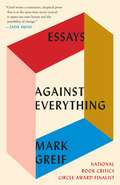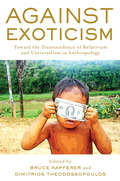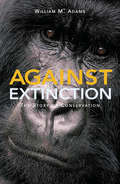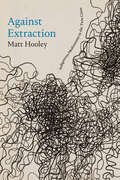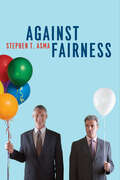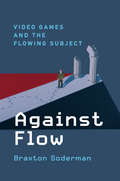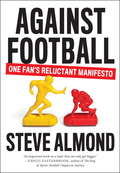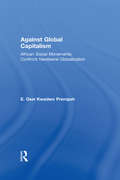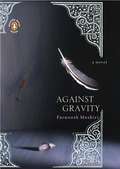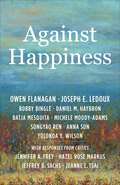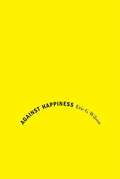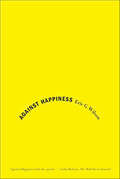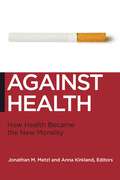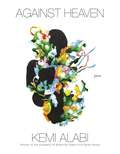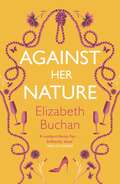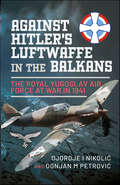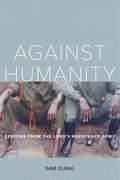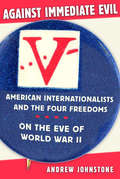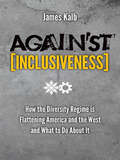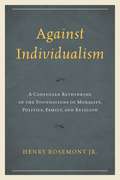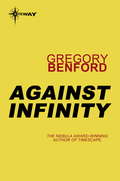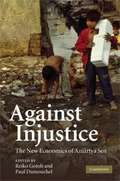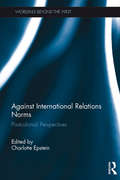- Table View
- List View
Against Everything: Essays
by Mark GreifA brilliant collection of critical essays by a young writer who is already a star in the intellectual firmament. As William Deresiewicz has written in Harper's Magazine, "[Mark Greif] is an intellectual, full stop...There is much of [Lionel] Trilling in Greif...Much also of Susan Sontag...What he shares with both, and with the line they represent, is precisely a sense of intellect--of thought, of mind--as a conscious actor in the world." Over the past eleven years, Greif has been publishing superb, and in some cases already famous, essays in n+1, the high-profile little magazine that he co-founded. These essays address such key topics in the cultural, political, and intellectual life of our time as the tyranny of exercise, the tyranny of nutrition and food snobbery, the sexualization of childhood (and everything else), the philosophical meaning of Radiohead, the rise and fall of the hipster, the impact of the Occupy Wall Street movement, and the crisis of policing. Four of the selections address, directly and unironically, the meaning of life--what might be the right philosophical stance to adopt toward one's self and the world. Each essay in Against Everything is learned, original, highly entertaining, and, from start to finish, dead serious. They are the work of a young intellectual who, with his peers, is reinventing and reinvigorating what intellectuals can be and say and do. Mark Greif manages to reincarnate and revivify the thought and spirit of the greatest of American dissenters, Henry David Thoreau, for our time and historical situation.From the Hardcover edition.
Against Exoticism: Toward the Transcendence of Relativism and Universalism in Anthropology
by Bruce Kapferer Dimitrios TheodossopoulosAnthropology begins in the encounter with the 'exotic': what stands outside of-and challenges-conventional or established understandings. This volume confronts the distortions of orientalism, ethnocentrism, and romantic nostalgia to expose exoticism, defined as the construction of false and unsubstantiated difference. Its aim is to re-found the importance of the exotic in the development of anthropological knowledge and to overcome methodological dualisms and dualistic approaches. Chapters look at the risk of exoticism in the perspectivist approach, the significant exotic corrective of Lévi-Strauss vis-à-vis an imperializing Eurocentrism, our nostalgic relationship with the ethnographic record, and the attempts of local communities to readapt previous exoticized referents, renegotiate their identity, and 'counter-exoticize.' This volume demonstrates a range of approaches that will be valuable for researchers and students seeking to effectively establish comparative methodological frameworks that transcend issues of relativism and universalism.
Against Extinction: The Story of Conservation
by William Bill Adams'Conservation in the 21st century needs to be different and this book is a good indicator of why.' Bulletin of British Ecological Society Against Extinction tells the history of wildlife conservation from its roots in the 19th century, through the foundation of the Society for the Preservation of the Wild Fauna of the Empire in London in 1903 to the huge and diverse international movement of the present day. It vividly portrays conservation's legacy of big game hunting, the battles for the establishment of national parks, the global importance of species conservation and debates over the sustainable use of and trade in wildlife. Bill Adams addresses the big questions and ideas that have driven conservation for the last 100 years: How can the diversity of life be maintained as human demands on the Earth expand seemingly without limit? How can preservation be reconciled with human rights and the development needs of the poor? Is conservation something that can be imposed by a knowledgeable elite, or is it something that should emerge naturally from people's free choices? These have never been easy questions, and they are as important in the 21st century as at any time in the past. The author takes us on a lively historical journey in search of the answers.
Against Extraction: Indigenous Modernism in the Twin Cities
by Matt HooleyIn Against Extraction Matt Hooley traces a modern tradition of Ojibwe invention in Minneapolis and St. Paul from the mid-nineteenth century to the present as that tradition emerges in response to the cultural legacies of US colonialism. Hooley shows how Indigenous literary and visual art modernisms challenge the strictures of everyday life and question the ecological, political, and cultural fantasies that make multivalent US colonialism seem inevitable. Hooley analyzes literature and art by Louise Erdrich, William Whipple Warren, David Treuer, George Morrison, and Gerald Vizenor in relation to histories of Indigenous dispossession and occupation, enslavement and Black life, and environmental harm and care. He shows that historical narratives of these cities are intimately bound up with the violence of colonial systems of extraction and that concepts like Indigeneity and sovereignty extend beyond treaty-granted promises of political control. These works, created in opposition and proximity to the extraction of cultural, political, and territorial resources, demonstrate how Indigenous claims to life and land matter to rethinking and unmaking the social and ecological devastations of the colonial world.
Against Fairness
by Stephen T. Asma“Mr. Asma offers a rightly critical diagnosis of our obsession with egalitarianism.” —The Wall Street JournalIn our zealous pursuit of fairness, we have banished our urges to like one person more than another, one thing over another, hiding them away as dirty secrets of our humanity. In Against Fairness, polymath philosopher Stephen T. Asma drags them triumphantly back into the light. Through playful, witty, but always serious arguments and examples, he vindicates our unspoken and undeniable instinct to favor, making the case that we would all be better off if we showed our unfair tendencies a little more kindness—indeed, if we favored favoritism.Conscious of the egalitarian feathers his argument is sure to ruffle, Asma makes his point by synthesizing a startling array of scientific findings, historical philosophies, cultural practices, analytic arguments, and a variety of personal and literary narratives to give a remarkably nuanced and thorough understanding of how fairness and favoritism fit within our moral architecture. Drawing on thinkers from Confucius to Tocqueville to Nietzsche, he reveals how we have confused fairness with more noble traits, like compassion and open-mindedness. He dismantles a number of seemingly egalitarian pursuits, from classwide Valentine’s Day cards to civil rights, to reveal the envy that lies at their hearts, going on to prove that we can still be kind to strangers, have no prejudice, and fight for equal opportunity at the same time we reserve the best of what we can offer for those dearest to us.Watch an animated book trailer here: http://www.youtube.com/watch?v=GjPhTQ9zi5Q
Against Flow: Video Games and the Flowing Subject
by Braxton SodermanA critical discussion of the experience and theory of flow (as conceptualized by Mihaly Csikszentmihalyi) in video games.Flow--as conceptualized by the psychologist Mihaly Csikszentmihalyi--describes an experience of "being in the zone," of intense absorption in an activity. It is a central concept in the study of video games, although often applied somewhat uncritically. In Against Flow, Braxton Soderman takes a step back and offers a critical assessment of flow's historical, theoretical, political, and ideological contexts in relation to video games. With close readings of games that implement and represent flow, Soderman not only evaluates the concept of flow in terms of video games but also presents a general critique of flow and its sibling, play.
Against Football
by Steve Almond"Powerful...an important read." --Publishers WeeklyNew York Times bestselling author Steve Almond takes on America's biggest sacred cow: footballIn Against Football, Steve Almond details why, after forty years as a fan, he can no longer watch the game he still loves. Using a synthesis of memoir, reportage, and cultural critique, Almond asks a series of provocative questions:* Does our addiction to football foster a tolerance for violence, greed, racism, and homophobia?* What does it mean that our society has transmuted the intuitive physical joys of childhood--run, leap, throw, tackle--into a billion-dollar industry?* How did a sport that causes brain damage become such an important emblem for our institutions of higher learning?There has never been a book that exposes the dark underside of America's favorite game with such searing candor.From the Hardcover edition.n-dollar industry?* How did a sport that causes brain damage become the leading signifier of our institutions of higher learning?* Does our addiction to football foster a tolerance for violence, greed, racism, and homophobia?There has never been a book that exposes the dark underside of America's favorite game with such searing candor.From the Hardcover edition.
Against Global Capitalism: African Social Movements Confront Neoliberal Globalization
by E. Osei PrempehThe fundamental challenge of democratizing globalization by opening up spaces for democratic participation beyond the state is addressed in this study. The author captures both the democratic activities and voices of opposition to neoliberal globalization and investigates how this reinvention of democracy through resistance to neoliberal globalization has taken shape in the African context. In doing so, he reasserts the relevance of the de-globalization and anti-capitalism movements. With a careful selection of case studies, this volume is ideal for classroom use and library reference.
Against Gravity
by Farnoosh MoshiriSet in Houston in the mid-1980s, Against Gravityis a harrowing story of three lives colliding- Madison Kirby, an angry, dying intellectual; Ric Cardinal, a social worker dedicated to helping others but tormented by the son he cannot save; and Roya, a struggling Iranian immigrant who has traveled for years through the war-torn Middle East to arrive in Texas to eke out the most tenuous life for herself and her daughter. They each tell of their own lives, yet as their stories intertwine a portrait of shared struggle and loss emerges. A devastating and beautiful novel. "AGAINST GRAVITY is an intense novel, ambitious in its reach, intriguing in its structural complexity and the sophistication of its narration. It is the highly satisfying work of a mature writer that will leave the reader wanting more. I enjoyed it. " -Nuruddin Farah, author of Links, and the Blood in the SunTrilogy
Against Happiness
by Owen Flanagan Batja Mesquita Anna Sun Joseph E. LeDoux Daniel M. Haybron Michele Moody-Adams Bobby Bingle Songyao Ren Yolonda Y. WilsonThe “happiness agenda” is a worldwide movement that claims that happiness is the highest good, happiness can be measured, and public policy should promote happiness. Against Happiness is a thorough and powerful critique of this program, revealing the flaws of its concept of happiness and advocating a renewed focus on equality and justice.Written by an interdisciplinary team of authors, this book provides both theoretical and empirical analysis of the limitations of the happiness agenda. The authors emphasize that this movement draws on a parochial, Western-centric philosophical basis and demographic sample. They show that happiness defined as subjective satisfaction or a surplus of positive emotions bears little resemblance to the richer and more nuanced concepts of the good life found in many world traditions. Cross-cultural philosophy, comparative theology, and social and cultural psychology all teach that cultures and subcultures vary in how much value they place on life satisfaction or feeling happy. Furthermore, the ideas promoted by the happiness agenda can compete with rights, justice, sustainability, and equality—and even conceal racial and gender injustice.Against Happiness argues that a better way forward requires integration of cross-cultural philosophical, ethical, and political thought with critical social science. Ultimately, the authors contend, happiness should be a secondary goal—worth pursuing only if it is contingent on the demands of justice.
Against Happiness: In Praise of Melancholy
by Eric G. WilsonIn Against Happiness, the scholar Eric G. Wilson argues that melancholia is necessary to any thriving culture, that it is the muse of great literature, painting, music, and innovation and that it is the force underlying original insights and suggests it would be better to relish the blues that make humans people.
Against Happiness: In Praise of Melancholy
by Eric G. WilsonAmericans are addicted to happiness. When we're not popping pills, we leaf through scientific studies that take for granted our quest for happiness, or read self-help books by everyone from armchair philosophers and clinical psychologists to the Dalai Lama on how to achieve a trouble-free life: Stumbling on Happiness; Authentic Happiness: Using the New Positive Psychology to Realize Your Potential for Lasting Fulfillment; The Art of Happiness: A Handbook for Living. The titles themselves draw a stark portrait of the war on melancholy. More than any other generation, Americans of today believe in the transformative power of positive thinking. But who says we're supposed to be happy? Where does it say that in the Bible, or in the Constitution? In Against Happiness, the scholar Eric G. Wilson argues that melancholia is necessary to any thriving culture, that it is the muse of great literature, painting, music, and innovation—and that it is the force underlying original insights. Francisco Goya, Emily Dickinson, Marcel Proust, and Abraham Lincoln were all confirmed melancholics. So enough Prozac-ing of our brains. Let's embrace our depressive sides as the wellspring of creativity. What most people take for contentment, Wilson argues, is living death, and what the majority takes for depression is a vital force. In Against Happiness: In Praise of Melancholy, Wilson suggests it would be better to relish the blues that make humans people.
Against Health: How Health Became the New Morality (Biopolitics #18)
by Anna Kirkland Jonathan M. MetzlNavigates the divergent cultural meanings of health, and its entanglement with morality in current political discourseYou see someone smoking a cigarette and say,“Smoking is bad for your health,” when what you mean is, “You are a bad person because you smoke.” You encounter someone whose body size you deem excessive, and say, “Obesity is bad for your health,” when what you mean is, “You are lazy, unsightly, or weak of will.” You see a woman bottle-feeding an infant and say,“Breastfeeding is better for that child’s health,” when what you mean is that the woman must be a bad parent. You see the smokers, the overeaters, the bottle-feeders, and affirm your own health in the process. In these and countless other instances, the perception of your own health depends in part on your value judgments about others, and appealing to health allows for a set of moral assumptions to fly stealthily under the radar.Against Health argues that health is a concept, a norm, and a set of bodily practices whose ideological work is often rendered invisible by the assumption that it is a monolithic, universal good. And, that disparities in the incidence and prevalence of disease are closely linked to disparities in income and social support. To be clear, the book's stand against health is not a stand against the authenticity of people's attempts to ward off suffering. Against Health instead claims that individual strivings for health are, in some instances, rendered more difficult by the ways in which health is culturally configured and socially sustained.The book intervenes into current political debates about health in two ways. First, Against Health compellingly unpacks the divergent cultural meanings of health and explores the ideologies involved in its construction. Second, the authors present strategies for moving forward. They ask, what new possibilities and alliances arise? What new forms of activism or coalition can we create? What are our prospects for well-being? In short, what have we got if we ain't got health? Against Health ultimately argues that the conversations doctors, patients, politicians, activists, consumers, and policymakers have about health are enriched by recognizing that, when talking about health, they are not all talking about the same thing. And, that articulating the disparate valences of “health” can lead to deeper, more productive, and indeed more healthy interactions about our bodies.
Against Heaven: Poems
by Kemi AlabiWinner of the Academy of American Poets First Book Award, selected by Claudia Rankine. Kemi Alabi’s transcendent debut reimagines the poetic and cultural traditions from which it is born, troubling the waters of some of our country’s central and ordained fictions—those mythic politics of respectability, resilience, and redemption. Instead of turning to a salvation that has been forced upon them, Alabi turns to the body and the earth as sites of paradise defined by the pleasure and possibility of Black, queer fugitivity. Through tender love poems, righteous prayers, and vital provocations, we see the colonizers we carry within ourselves being laid to rest.Against Heaven is a praise song made for the flames of a burning empire—a freedom dream that shapeshifts into boundless multiplicities for the wounds made in the name of White supremacy and its gods. Alabi has written an astonishing collection of magnificent range, commanding the full spectrum of the Black, queer spirit’s capacity for magic, love, and ferocity in service of healing—the highest power there is.
Against Her Nature: 'a Modern Day Vanity Fair' Mail On Sunday
by Elizabeth BuchanA modern-day take on Vanity Fair, from bestselling novelistElizabeth Buchan. Love, money and children... Life is a risk, however much we try to protect ourselves... Unlike the Frants living their quiet ordered lives in the village of Appleford, Tess and Becky are of the generation that believes it can have everything. Highflyers in the high-octane world of London's high-finance, they move through the opportunists, the short-termists, the sharks, the bullies and the very, very rich to face many choices, not least the one presented by biology: children. As the different generations balance the challenges life throws at them, a tender and unexpected love story emerges alongside a journey to maturity in this bold and beautiful novel.
Against Her Will
by Ronald J. WatkinsRichard and Victoria Tinyes feared the worst when their thirteen-year-old daughter Kelly Ann vanished from their quiet suburban community of Valley Stream, New York on March 3, 1989. But the nightmare to come was worse than they could ever imagine. Only five doors away, in the home of John and Elizabeth Golub, police found Kelly Ann's body stuffed in a plastic garbage bag. She'd been brutally beaten, stabbed, strangled and mutilated. After weeks of intense investigation, police arrested the Golubs' twenty-one-year--old son. Robert--a reclusive young man obsessed with bodybuilding and given to fits of rage. The sensational trial and subsequent conviction of Robert Golub shocked the nation and tore the once-peaceful community apart. Neighbors took sides. So did the media. And no one who lived on Horton Road would ever be the same.
Against Hitler's Luftwaffe in the Balkans: The Royal Yugoslav Air Force at War in 1941
by Djordje I. Nikolic Ognjan M. Petrovic“The extraordinary photographs of aircraft, personnel, and facilities set this book apart.” -The Journal of the Air Force Historical Foundation Immediately following the end of the First World War, the air force of the newly-formed Southern Slav State, the Kingdom of Serbs, Croats and Slovenes, was forced to rely mainly on war-time Serbian Air Service aircraft and material left after the withdrawal of the French Armée de l’Air from the Balkans in 1919/1920. This equipment was supported by the addition of French war surplus stocks which started arriving in 1921. In 1929 the monarchy changed its name to the Kingdom of Yugoslavia. Then, from 1930, the official name of the air service branch its military was changed to what is commonly known in the West as the Royal Yugoslav Air Force (RYAF). The obsolete First World War aircraft were replaced from 1925 onwards by stop-gap solutions purchased mainly from France, some from the Czechoslovakian Republic as well as from the first domestic factories. From 1936, the RYAF again began to reorganize and modernize, with the purchase of the most modern aircraft available at that time. These aircraft were imported from the UK, Germany and Italy, some being built under license in domestic factories. During this period the Kingdom of Yugoslavia succeeded, as much as conditions allowed, to equip its air force with the most advanced fighter and bomber types of the period. For the Kingdom of Yugoslavia, the Second World War started on 6 April 1941. The military coup d’etat of 27 March 1941 and anti-German demonstrations in Belgrade clearly aligned the kingdom with the Allies. That same day, Hitler ordered the implementation of Unternehmen 25 (Operation 25) – the attack against Kingdom of Yugoslavia. Hitler had also secured Mussolini’s support for this campaign, while Hungary, Romania and Bulgaria gave active or passive backing in exchange for territorial claims in Yugoslavia. Despite all the odds, the airmen of the RYAF fought gallantly in the defense of their homeland, with fighters taking on the German and Italian bombers and their escort fighters – including the Axis types in service with the RYAF. Eventually, due to the deteriorating situation on the front and the ever-increasing risk of the king and his government being captured, the decision was taken to evacuate by air to Greece. In the summer of the 1941 some 220 Yugoslav aviators gathered in Egypt and continued the fight against Axis, this time in the colors of the RAF. This is the full story of their service and combats in the early months of that year.
Against Hope
by Victor SantosIt has been years since an insane family of neo-Nazi's murdered her boyfriend and almost killed Hope -- now she is tracking them down and exacting her bloody revenge.Raised by a martial arts master, Hope grew from an angry and grieving teenage girl into a cold-hearted bounty hunter. When she discovers the family who brutalized her is now running for public office and controlling a cabal of violent white nationalists from the shadows, Hope gears up and hits the road with the intent to slaughter every single Nazi that gets in her way. Victor Santos (Polar - now a hit Netflix movie) writes and draws a new story with brutal fight scenes and impactful revelations that echo across decades of the main character's life.
Against Humanity: Lessons from the Lord's Resistance Army
by Sam Dubal“Gunya is a woman in her late twenties. Soldiers of the Lord’s Resistance Army (LRA) abducted her when she was eleven years old and forcefully conscripted her into the rebel ranks. Gunya spent a little over a decade with the rebels before deserting. While there, she gave birth to a son with Onen, an LRA soldier. Though abducted, she expresses her continued support for the LRA and their tactics, admitting that she sometimes thinks of going back to the lum [bush] when life becomes hard as a civilian at home.” This is not a book about crimes against humanity. Rather, it is an indictment of the very idea of humanity, the concept that lies at the heart of human rights and humanitarian missions. Based on fieldwork in northern Uganda, anthropologist and medical doctor Sam Dubal brings readers into the inner circle of the Lord’s Resistance Army, an insurgent group accused of rape, forced conscription of children, and inhumane acts of violence. Dubal speaks with former LRA rebels as they find personal meaning in wartime violence, politics, and spirituality—experiences that observers often place outside of humanity’s boundaries. What emerges is an unorthodox and provocative question: What would it mean to be truly against humanity? And how does one honor life existing outside hegemonic notions of the good?
Against Immediate Evil: American Internationalists and the Four Freedoms on the Eve of World War II
by Andrew JohnstoneIn Against Immediate Evil, Andrew Johnstone tells the story of how internationalist Americans worked between 1938 and 1941 to convince the U.S. government and the American public of the need to stem the rising global tide of fascist aggression. As war approached, the internationalist movement attempted to arouse the nation in order to defeat noninterventionism at home and fascism overseas. Johnstone's examination of this movement undermines the common belief that the Japanese attack on Pearl Harbor wrenched an isolationist United States into global armed conflict and the struggle for international power. Johnstone focuses on three organizations—the American Committee for Non-Participation in Japanese Aggression, the Committee to Defend America by Aiding the Allies, and Fight For Freedom—that actively promoted a more global role for the United States based on a conception of the "four freedoms" later made famous by FDR. The desire to be free from fear was seen in concerns regarding America’s immediate national security. The desire to be free from want was expressed in anxieties over the nation’s future economic prosperity. The need for freedom of speech was represented in concerns over the potential loss of political freedoms. Finally, the need for freedom of worship was seen in the emphasis on religious freedoms and broader fears about the future of Western civilization. These groups and their supporters among the public and within the government characterized the growing global conflict as one between two distinct worlds and in doing so, set the tone of American foreign policy for decades to come.
Against Inclusiveness: How the Diversity Regime is Flattening America and the West and What to Do About It
by James KalbDiversity. Inclusiveness. Equality.--ubiquitous words in 21st-century political and social life. But how do those who police the limits of acceptable discourse employ these as verbal weapons to browbeat their often hapless fellows into having a "real conversation"? How do these terms function as mere doublespeak for the expectation of full-scale capitulation to the views of "right-thinking people"? Those who have long been afraid to touch the issues that attend these words will take great reassurance in an articulate statement of the kind presented in Against Inclusiveness, where the author's approach is sober and extremely well reasoned, as he attempts to marshal truth and fairness as criteria in the examination of issues critical to modern social life. Kalb argues that in current inclusiveness ideology, "classifying people" becomes an exercise of power by the classifier that denies the dignity of the person classified. All rational consideration of human reality is thereby suspended, and the result is something arbitrary and increasingly tyrannical. Against Inclusiveness lays the foundation for what an honest, forthright, real conversation on these matters might look like.
Against Individualism: A Confucian Rethinking of the Foundations of Morality, Politics, Family, and Religion
by Henry RosemontThe first part of Against Individualism: A Confucian Rethinking of the Foundations of Morality, Politics, Family, and Religion is devoted to showing how and why the vision of human beings as free, independent and autonomous individuals is and always was a mirage that has served liberatory functions in the past, but has now become pernicious for even thinking clearly about, much less achieving social and economic justice, maintaining democracy, or addressing the manifold environmental and other problems facing the world today. In the second and larger part of the book Rosemont proffers a different vision of being human gleaned from the texts of classical Confucianism, namely, that we are first and foremost interrelated and thus interdependent persons whose uniqueness lies in the multiplicity of roles we each live throughout our lives. This leads to an ethics based on those mutual roles in sharp contrast to individualist moralities, but which nevertheless reflect the facts of our everyday lives very well. The book concludes by exploring briefly a number of implications of this vision for thinking differently about politics, family life, justice, and the development of a human-centered authentic religiousness. This book will be of value to all students and scholars of philosophy, political theory, and Religious, Chinese, and Family Studies, as well as everyone interested in the intersection of morality with their everyday and public lives.
Against Infinity: Jupiter Project Book 2
by Gregory BenfordOn the poisonous, icy surface of Ganymede, a man and a boy are on a deadly hunt. Their prey is the Aleph - an unknowable alien artifact that roamed and ruled Ganymede for countless millennia. Indescribable, infinitely dangerous, the Aleph haunts men's dreams and destroys all efforts to terraform Ganymede into a habitable planet. Now in a modern world ancient struggle is joined, as a boy seeks manhood, a man seeks enlightenment, and a society seeks the power to rule the universe.
Against Injustice: The New Economics of Amartya Sen
by Reiko Gotoh Paul DumouchelTraditional theories of justice as formulated by political philosophers, jurists and economists have all tended to see injustice as simply a breach of justice, a breakdown of the normal order. Amartya Sen's work acts as a corrective to this tradition by arguing that we can recognise patent injustices, and come to a reasoned agreement about the need to remedy them, without reference to an explicit theory of justice. Against Injustice brings together distinguished academics from a variety of different fields - including economics, law, philosophy and anthropology - to explore the ideas underlying Sen's critique of traditional approaches to injustice. The centrepiece of the book is the first chapter by Sen in which he outlines his conception of the relationship between economics, ethics and law. The rest of the book addresses a variety of theoretical and empirical issues that relate to this conception, concluding with a response from Sen to his critics.
Against International Relations Norms: Postcolonial Perspectives (Worlding Beyond the West)
by Charlotte EpsteinThis volume uses the concept of ‘norms’ to initiate a long overdue conversation between the constructivist and postcolonial scholarships on how to appraise the ordering processes of international politics. Drawing together insights from a broad range of scholars, it evaluates what it means to theorise international politics from a postcolonial perspective, understood not as a unified body of thought or a new ‘-ism’ for IR, but as a ‘situated perspective’ offering ex-centred, post-Eurocentric sites for practices of situated critique. Through in-depth engagements with the norms constructivist scholarship, the contributors expose the theoretical, epistemological and practical erasures that have been implicitly effected by the uncritical adoption of ‘norms’ as the dominant lens for analysing the ideational dynamics of international politics. They show how these are often the very erasures that sustained the workings of colonisation in the first place, whose uneven power relations are thereby further sustained by the study of international politics. The volume makes the case for shifting from a static analysis of ‘norms’ to a dynamic and deeply historical understanding of the drawing of the initial line between the ‘normal’ and the ‘abnormal’ that served to exclude from focus the 'strange' and the unfamiliar that were necessarily brought into play in the encounters between the West and the rest of the world. A timely intervention, it will be of great interest to students and scholars of international relations, international relations theory and postcolonial scholarship.
